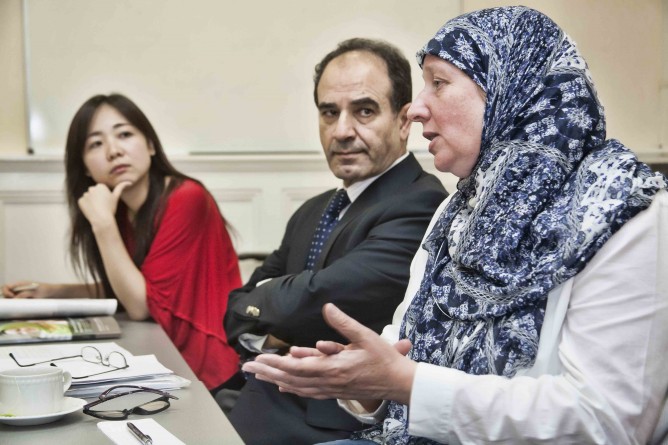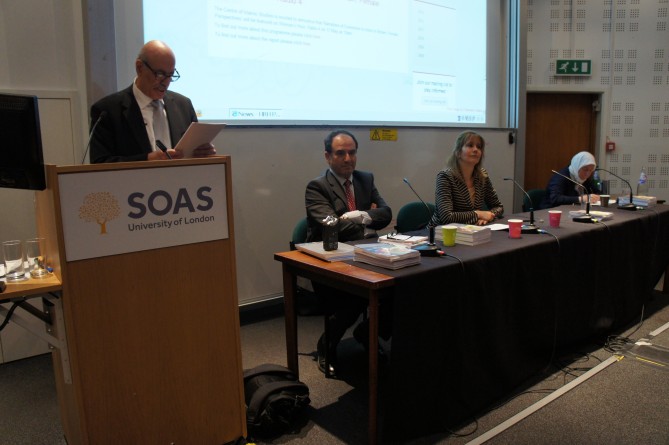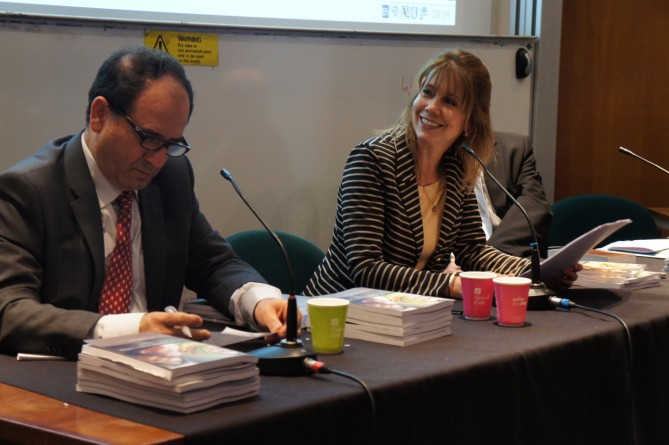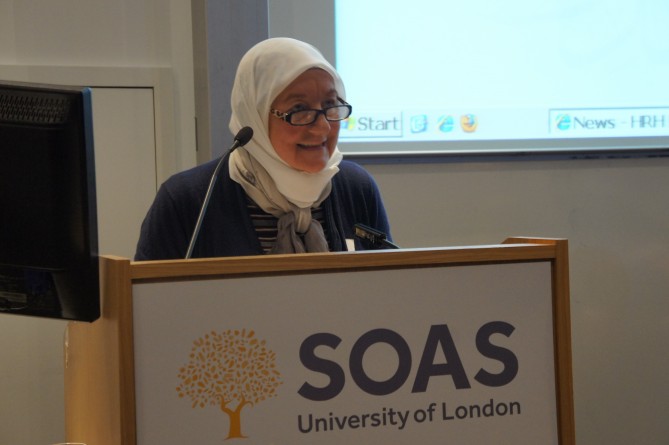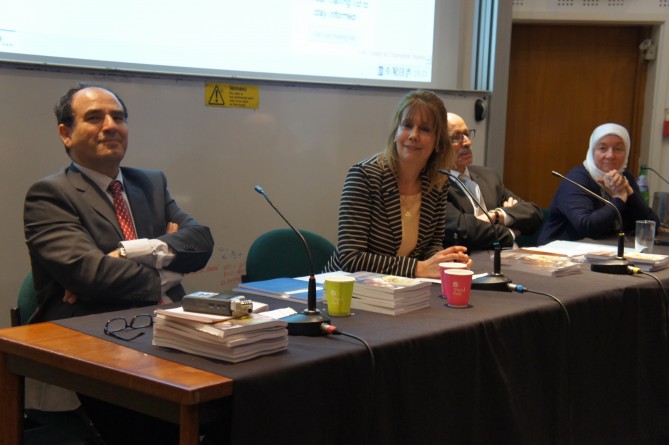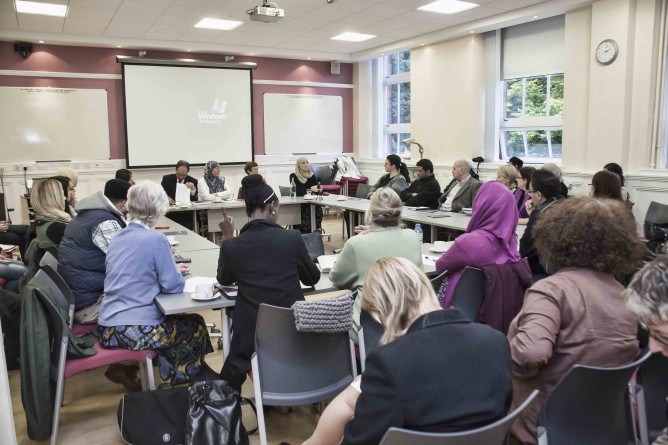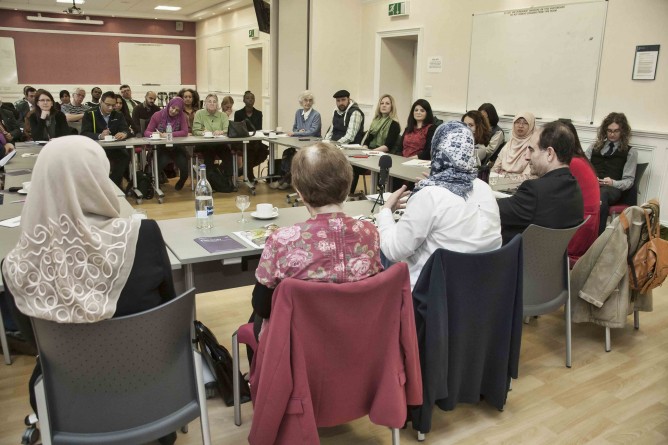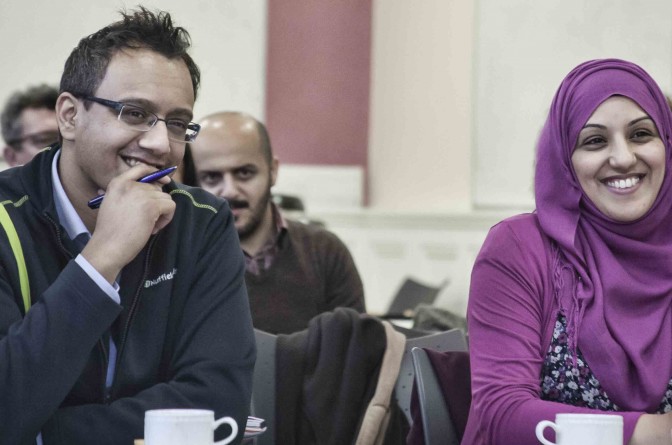Narratives of Conversion to Islam in Britain: Female Perspectives
October 2011 – January 2012
University of Cambridge
Narratives of Conversion to Islam: Female Perspectives brought together more than forty female Muslim converts to discuss aspects of their conversions to Islam, to reflect on their journeys and experiences and to produce a report to inform Muslims and non-Muslims about the topic. The participants reflected on the personal and social aspects of their experiences, including the impact on the individual and the family. The preliminary meeting commented on the generally shallow treatment of the topic in the media amid a rising interest in women converts to Islam. The underlying assumption in most media reporting is the sense of surprise, to put it mildly, that women would want to convert to a religion that oppressed them. While this is not the motivation for the project, it is still an important part of the context against which it is conceived.
Download the Narratives of Conversion to Islam in Britain – Female Perspectives report.
Interview with the Project Leader, Professor Yasir Suleiman
Please scroll down to the bottom of the page for interviews with participants.
News and Media Coverage
‘A ground-breaking report examining the experiences of nearly 50 British women of all ages, ethnicities, backgrounds and faiths (or no faith) – who have all converted to Islam – was launched in London yesterday by the University of Cambridge.’ (Cambridge Research News)
- University of Cambridge Research News, January 2012: “A project concluding this weekend examines why women choose to convert to Islam…” Read the article here.
- UK Launch of the report, 16 May 2013: 6-8pm at The Khalili Lecture Theatre, The School of Oriental & African Studies (SOAS). Speakers: Professor Yasir Suleiman, University of Cambridge, Mrs Batool Al-Toma, Director, New Muslims Project, Professor Muhammad Abdel Haleem, SOAS, Chair: Ms. Kristiane Backer.
- BBC Three Counties Radio, 20 October 2013: Andrea Chishti, a participant in the Narratives of Conversion report, and Layla Reeb spoke to Chetan Pathak about their conversions to Islam and some findings from the Centre’s report. To listen to the interview please click here.
- The Guardian, ‘Converting to Islam: British women on prayer, peace and prejudice’. Read the article here.
- BBC Radio 4, “Why do British women convert to Islam?” Professor Suleiman discusses the report on Women’s Hour.
- The Times, ‘Women converts to Islam risk rejection and abuse’. Read the article here.
- The Times Higher Education, ‘Female converts to Islam considered in new study’. Read the article here.
- The Economist, ‘Changing my religion’, Read the article here.
- The Huffington Post, ‘Supporting Converts to Islam Should Concern Us All’. Read the article here.
- The Huffington Post, ‘Muslim Women Converts Tell of Hijab Dilemmas, Family Rows and Negative Portrayal of Faith’. Read the article here.
- The Conversation, ‘Converting to Islam “is not for the faint-hearted,” report says’. Read the article here.
- BBC Religion, ‘The British Women converting to Islam’. Read the article here.
- Phys Org, ‘Female Conversion to Islam in Britiain Exmined in Unique Research Project’. Read the article here.
- The Hindu, ‘Seeking Allah in the Midlands’. Read the article here.
Symposia
A series of three symposia were organised by the Centre of Islamic Studies to facilitate discussion between Muslim women about their experiences of conversion and its social aspects
- Symposium 1: Family, Appearing as a Muslim and Lifestyle
- Symposium 2: Intra Muslim Relations, Marriage and Media
- Symposium 3: Genders and Sexuality, Identity, Citizenship and Political Engagement and Struggles within the Faith
Symposium I: Family, Appearing as a Muslim & Lifestyle
Family
- Who guides and how guidance is provided to those expressing an interest in Islam.
- At what stage in the conversion process do converts present their interest in Islam to their families and how is this achieved? How does the convert respond to the reactions from family members?
- To what extent does marriage impact upon converts’ understanding, implementation and expression of Islam?
- How do converts initiate a process of believing in Islam as themselves rather than adopting imposed traditions, beliefs and identities?
- How can a fiqh of minorities be transmitted to converts and what would be the perceived benefits of doing so?
- To what extent do cultural expressions transposed upon Islam, which is transmitted to converts, contribute to the breakdown/straining of family relationships between converts and their families of origin?
Appearing as a Muslim
- How far do outward expressions of Islam convey change within a person? Is there a link between dress and piety? Does dress impact upon spirituality?
- How significant is spirituality in the conversion transition and the continuing conversion process and to what extent does research address or avoid the spiritual significance of conversion?
- To what extent can an assessment be made of the social impact of appearances both to Muslim and non-Muslim society?
- How do converts counter the insecurities arising from expressing or not expressing Islam through dress codes and how significant is this in relation to living in the UK?
- What are the possible effects of changing names/identities?
Lifestyle
- How do conversions to Islam impact upon converts lifestyles –what changes do they initiate?
- To what extent are British modes of socialising compatible to converts?
- Is compromise involved when maintaining relationships with non-Muslims?
- How do converts re-socialise themselves with wider society? To what extent are they able to achieve this?
- Are there issues of acceptance from British society directed towards converts?
- What, if any, roles should converts assume to create better understanding / relations with wider society and how could Converts to Islam impact on negative stereotypes in the dominant culture?
Symposium II: Intra Muslim Relations, Marriage & Media
Intra Muslim Relations
- How do converts sustain a presence in the Muslim community? To what extent are they accepted as authentic Muslims? What are the barriers to inclusion?
- To what extent do heritage Muslims question converts’ interpretations or practice of Islam and what impact does this have on the notion of ‘believing as ourselves’?
- Is there any evidence to suggest that heritage Muslims and Islamic organisations want to have a degree of domination and control over new Muslims?
- How do anti-Western sentiments held by elements of the Muslim diasporas impact on the convert’s understanding of citizenship?
- How do converts negotiate an unfamiliar religious infrastructure, particularly one that presents itself as not designed for women or for converts?
- With theology derived solely from Muslim countries, how can theological approaches develop to incorporate Islam in a British context so that scholars can respond appropriately to the needs and concerns of converts that are specific to the UK?
- Do converts make a conscious choice to adopt Shia, Sunni, Ismaili etc. perspectives?
- To what extent do converts move between Sufi, Salafi, Deobandi etc. representations of Islam presented by the heritage Muslim community?
Marriage and forms of marriage
- How are marriages convened for converts, who facilitates marriage for converts, can converts facilitate their own marriages successfully?
- Where can converts find support and assistance both before and during marriage?
- To what extent does the apparent lack of family and community support impact on the Muslim marriage?
- How do the children of converts to Islam fare – what impact does their parents’ conversion make on their future decisions regarding their religious faith, how does it affect their ability to integrate into British society and affect their life chances?
- Are there differences in experience according to whether one or both parents are converts, where one parent is born into the faith and the other is a convert or, if the parents convert during different stages of the child’s life?
- Is polygamy more inherent among converts than the wider Muslim population?
- To what extent can polygamy be accepted in a Western context?
Media
- How do media representations affect and impact on converts’ self-perceptions and how do they influence the views of wider society?
- Does the media amplify representations of converts as radicals, potential or actual terrorists and as such anti-Western?
- In the mixture of ‘curious fascination and incomprehension’ that is the media portrayal of conversion what aspects of conversion are emphasised and which aspects fail to be acknowledged through media outlets?
- What can we do to challenge Islamophobia or media hype about Islam and Muslims?
- To what extent are relationships between converts to Islam and heritage Muslims portrayed by the media as deviant or culturally inappropriate?
- Is there a particular use of language by the media to raise concerns about the rate of conversion in the UK as a scare tactic?
- Is it possible that the media could present conversion to Islam as a vital tool in anchoring one’s lifestyle in a more normative manner?
- Summing up ways forward – What changes can we suggest in order to bring about a more constructive and supportive environment for converts?
Symposium III: Genders and Sexuality, Identity, Citizenship and Political Engagement & Struggles within the Faith
Gender
- Can a Western view of gender coexist with the Islamic faith?
- Does conversion to Islam necessitate a re-evaluation of a convert’s attitude towards gender equality?
- Does conversion provide a form of empowerment or a form of oppression for a woman?
- How does the process of conversion affect the way women are viewed by the non-Muslim community?
- Does the experience of being a Muslim woman differ from what converts think Islam offers women?
- How do converts perceive the representation of Muslim women by their own (convert community) AND the heritage Muslim community?
- Some heritage Muslim communities may possess misogynistic attitudes towards women, which are not only based on double standards, but also operate against the tenets of Islam. How do these views impact on female converts?
- Does a female convert have a more difficult experience in conversion than a male convert?
Sexuality
- How do notions of the norms of Western sexual activity impact on female converts?
- To what extent do attitudes towards female sexuality affect intimacy within marriage?
- In a society which places so much emphasis on a woman’s attractiveness, does opting out of this game empower or disempower her?
- How has the process of conversion impacted converts views on sexual orientation?
- How should British Muslims deal responsibly and compassionately with lesbian, gay, bisexual and transsexual converts to Islam?
- Does a distinction between acts and identities enable a more tolerant and compassionate approach to the LGBT community?
Identity
- How do converts present their identity as Muslims?
- Do converts’ experiences enable full acceptance of their identities when they come into Islam?
- Conversely, do converts feel pressured to compromise their identity when they come into Islam?
- Does a convert have to empty out some of their existing Western identity when converting?
- If so, does this hollowing out of an identity make them susceptible to multiple and conflicting identities presented by Muslim communities?
Citizenship and Political Engagement
- Does conversion affect converts’ interaction or relationship with the state? (ability to be politically, civically or locally engaged/ converts’ political leanings etc.)
- Does conversion change the type of roles converts can play in local communities or in national politics?
- Where accepted norms held by wider society conflict with Islamic values, how does a convert respond to these?
- Is it more difficult for a convert to engage with the non-Muslim community or state as a ‘representative’ of the Muslim community?
- With far-right politics being ever more focused on Muslims, do converts find themselves more politically active or aware after conversion?
- How does a convert experience politics within the Muslim community?
- To what extent are converts under pressure to accept conservative or even extremist political views, for example, those who hold that political engagement in a non-Muslim society is a form of impiety?
Struggles within the faith
- What facets of Islam do converts find difficult to reconcile with their previously held beliefs?
- How do converts maintain their faith and what difficulties may cause their faith to waiver?
- How difficult is it to differentiate between the behaviour of Muslims and the tenets of Islam?
- Is leaving Islam an option or even possible?
- Do people remain as Muslims because of the perceived penalties associated with leaving Islam?
Questioning Islam – is this possible?
- To what extent do stories about the Prophet and his marriages contribute to misunderstandings, hostility and the leaving of Islam?
- To what extent does the rise of Islamic fundamentalism and Islamophobia contribute to converts wishing to leave Islam?
- Does the converts’ lack of Qur’anic exegesis contribute to intolerance towards non-believers?
- Can gender differences and the notions of control and authority as perceived by male Muslims be a contributory factor to converts leaving Islam?
‘Narratives of Conversion to Islam in Britain: Female Perspectives’ Interviews
Ioni Sullivan, Participant
Imelda Ryan, Participant
Anita Nayyar, Participant
Kristiane Backer, Participant
Andrea Chishti, Participant
Ann Coxon, Participant
Kathleen Roche, Participant


